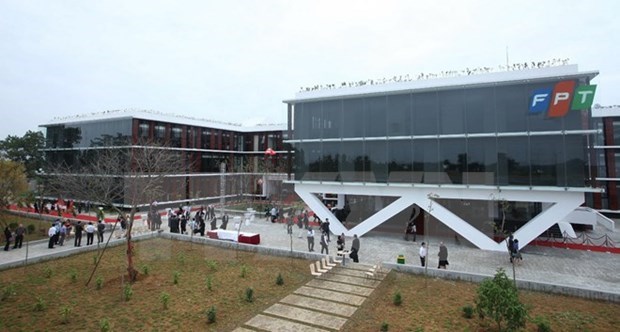Hanoi city aims to improve startup ecosystem
Hanoi is taking measures to tackle difficulties facing local firms, especially newly established small- and medium-sized enterprises (SMEs).
 A corner of the software village in Hoa Lac Hi-tech Park of Hanoi (Photo: VNA)
A corner of the software village in Hoa Lac Hi-tech Park of Hanoi (Photo: VNA)Hanoi (VNA) – Hanoi is taking measures to tackle difficulties facing local firms, especially newly established small- and medium-sized enterprises (SMEs).
Data of the municipal Department of Planning and Investment show that businesses in the Vietnamese capital have developed in both quantity and quality in recent years.
Hanoi is currently home to about 260,000 companies, ranking second in the country in terms of the number of businesses, and 97 percent of these firms are SMEs. More than 20,000 new companies have been set up annually in the last three years.
There is one company for every 38 local residents on average, 3.7 times higher than the national average, statistics show.
However, there remain several issues posing challenges to businesses’ operations. Only about 0.1 percent of local startups have succeeded in attracting capital from investment funds.
Challenges to SMEs
Some economic experts blamed that fact partly on shortcomings in support for SMEs, saying that support programmes and policies haven’t been implemented in a synchronous manner. Although the single-window mechanism for handling administrative procedures has been deployed at multiple levels, procedures still involve different departments and sectors, leading to the slow handling of paperwork.
Additionally, firms still lose time and money in accessing resources for production and business activities such as credit, land, market and support for setting up new companies.
A representative of the Vietnam Agricultural Food and Products Import-Export Joint Stock Company said collateral is one of the biggest difficulties facing businesses when seeking loans. Cumbersome borrowing procedures have also eroded many SMEs’ intention to look for bank lending, forcing them to seek funding from “black” credit sources.
Banks need to take solutions to facilitate enterprises’, especially SMEs’, access to loans, he noted.
Experts said many SMEs have encountered difficulties accessing bank loans because most of them are small and lack concrete operational plans. Low resilience to risks and macro-economic changes has also affected their operational effectiveness, loan use efficiency and capacity of loan repayment.
In particular, the financial capacity of many SMEs is still modest while they still lack financial information transparency and collateral. These are the main reasons affecting their bank credit accessibility, according to experts.
Hanoi moves to support startups
To help local businesses develop, the Hanoi People’s Committee has issued a startup support plan to assist 500 startup projects to develop and 150 startups to commercialise their products by 2025. Among the startups, at least 20 percent are hoped to successfully attract funding from venture capital funds and carry out mergers or acquisitions worth some 500 billion VND (nearly 21.5 million USD).
The city also aims to support the establishment of from 2-3 business incubators or startup spaces, facilitate the formation of from 3-5 private startup investment funds and attract foreign funds to this field.
This plan was adopted at the ninth meeting of the municipal People’s Council in early July. It was built on the basis of the Government’s Decision No. 844/QD-TTg, dated May 18, 2016, which approved the national entrepreneurial ecosystem support plan until 2025.
Support policies under the Hanoi scheme targets individuals and groups of individuals with startup projects; newly established SMEs; organisations supplying services, technical infrastructure and communications to startups; along with Vietnamese and foreign investment funds.
The plan looks to complete the local entrepreneurial ecosystem and create a favourable environment for the formation and development of businesses that can grow fast based on the optimisation of intellectual property, technology and new business models.
The city will tweak mechanisms and policies to support local entrepreneurial activities. In particular, it will assist newly established firms to carry out communications, build their business culture, train human resources, equip themselves with entrepreneurial knowledge and develop infrastructure for their operations.-VNA












